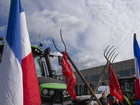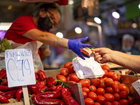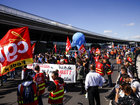In the wake of Hezbollah’s launching of three drones towards the Karish offshore gas field, the United States warned Lebanon that it might face “deterring punitive measures” that might involve “slapping oil sanctions” on the country, media reports said on Tuesday.
“U.S. mediator Amos Hochstein openly cautioned Lebanese officials that such a step would torpedo the U.S. efforts and could subject the Lebanese investments in the oil and gas resources to the threat of sanctions, especially that it targeted a maritime area that is outside of Lebanon’s internationally-recognized border under the U.N. records,” diplomatic sources told the Nidaa al-Watan newspaper.
 Full Story
Full Story
The euro sank Tuesday to the lowest dollar level since 2002 as data pointed to growing recession risks in the eurozone.
 Full Story
Full Story
A leading Swiss nongovernmental group on Monday called out Switzerland as a "safe haven" for Russian oligarchs and as a trading hub for Russian oil, grain and coal.
Public Eye urged the Swiss executive branch to "use all levers at its disposal to stop the financing of this inhuman aggression," in a reference to Russian President Vladimir Putin's war in Ukraine that has killed thousands of people, driven millions from their homes, and rippled through world economy by driving up food and fuel prices.
 Full Story
Full Story
Dutch farmers angry at government plans to slash emissions used tractors and trucks Monday to blockade supermarket distribution centers, the latest actions in a summer of discontent in the country's lucrative agricultural sector.
The Netherlands' busiest aviation hub, Schiphol Airport, urged travelers to use public transport to get to its terminals amid fears that the blockades also would target airports. Fishermen acting out of solidarity with farmers also blocked a number of harbors.
 Full Story
Full Story
Ghana said on Friday it was seeking International Monetary Fund (IMF) support for its economy, battered by inflation, a pandemic slump and the war in Ukraine.
 Full Story
Full Story
New Zealand Prime Minister Jacinda Ardern on Friday made her first visit to the U.K. since both countries signed a free trade agreement, meeting with British Prime Minister Boris Johnson to boost bilateral ties and discuss Russia's war in Ukraine.
The trip came after both leaders attended the NATO summit in Madrid. They will also discuss security challenges facing the Indo-Pacific region.
 Full Story
Full Story
Inflation in countries using the euro set another eye-watering record, pushed higher by a huge increase in energy costs fueled partly by Russia's war in Ukraine.
Annual inflation in the eurozone's 19 countries hit 8.6% in June, surging past the 8.1% recorded in May, according to the latest numbers published Friday by the European Union statistics agency, Eurostat. Inflation is at its highest level since recordkeeping for the euro began in 1997.
 Full Story
Full Story
Flights from Charles de Gaulle Airport in Paris and other French airports faced disruptions Friday as airport workers held a strike to demand salary hikes to keep up with inflation and an urgent hiring push to deal with resurgent travel demand.
The labor action is the latest trouble to hit global airports this summer, as travel resurges after two years of virus restrictions.
 Full Story
Full Story
At a tourism conference in Phuket last month, Thailand's prime minister looked out at attendees and posed a question with a predictable answer.
"Are you ready?" Prayuth Chan-ocha asked, dramatically removing his mask and launching what's hoped to be the country's economic reset after more than two years of coronavirus-driven restrictions. When the crowd yelled its answer — yes, according to local media — it might have been speaking for the entire pandemic-battered world.
 Full Story
Full Story
Oil prices are high, and drivers are paying more at the pump. But the OPEC oil cartel and allied producing nations may not be much help as they decide Thursday how much more crude to send to world markets.
That's because the 23-member OPEC+ alliance, which includes Russia, is struggling to produce enough oil to keep up with the rebounding demand for fuel since the COVID-19 pandemic. Plus, Western buyers are shunning barrels from Russia over its war in Ukraine, meaning there's less oil on the market to go around.
 Full Story
Full Story



